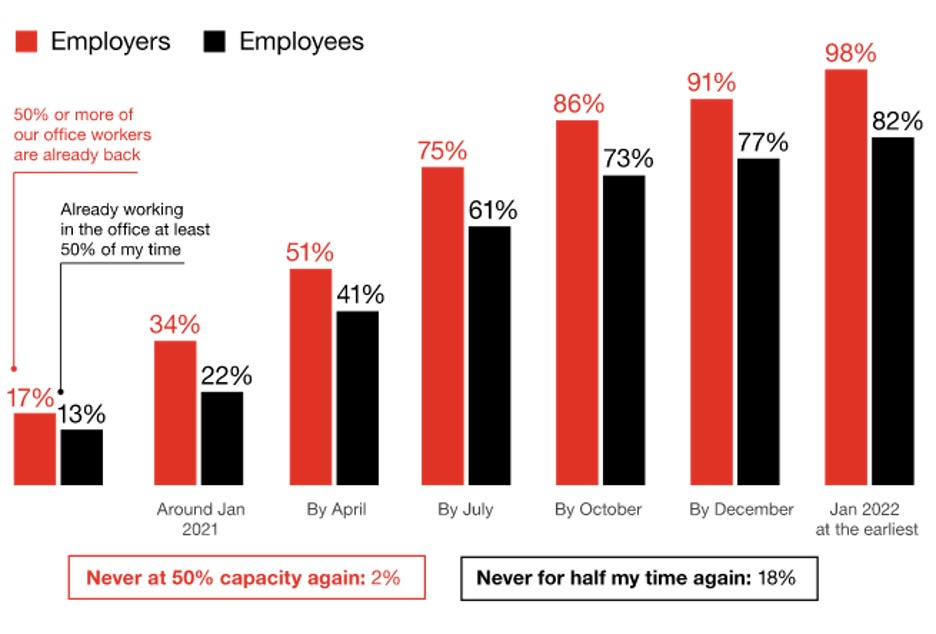Many of us were abruptly launched into the world of remote work last year. Is remote work here to stay? What will a post-COVID world look like in the workplace?

Industries with remote work potential
The potential for remote work is greatest in the computer-based workforce. Remote work and virtual meetings will probably continue, now that people have discovered the convenience of attending meetings from anywhere!
Real estate and education are other industries with virtual working potential. Showing and managing real estate doesn’t require an office! Many universities have implemented virtual classrooms this last year and may keep a portion of their classes virtual post-COVID.
Some industries have grown during this era of remote work. According to the U.S. Commerce Department report, non-store spending was up 31.3% in 2020. Virtual businesses are booming as well, such as telemedicine, online banking, and entertainment.
Not all businesses will profit from the remote work trend, however. Remote work will cause a decline in businesses related to restaurants, hotels, and leisure options in downtown areas. It will affect business travel, too. There will be a decreased need for hotels, airports, and rental cars.
Benefits of continuing remote work
Increased employee morale
Employees will start to demand work from home options. Before Covid, many tech employees expressed an interest in remote work options. Now that they’ve experienced remote work, they will want to continue.
Managers have learned new management techniques. There isn’t as much room for micromanagement in a remote work environment. This allows personal growth in employees. New management techniques are required for managers who are accustomed to walking around to supervise their employees’ every move. Productivity is determined by results instead of direct supervision.
We’ve all seen the results of remote work. It typically produces happier employees, reduced stress, no commute anxiety, and more family time.
Decreased expenses
There are many cost-saving opportunities to be found in remote work. This is especially true for startups – no need for massive office space, or, maybe any office space at all! Business travel has reduced. If it can be accomplished virtually, there is no need for plane tickets, meals out, hotels, and rental cars.
Kate Lister, president of Global Workplace Analytics (GWA), and an authority on integrated work-at-home strategies said “…a typical employer can save about $11,000/year for every person who works remotely half of the time.”
After all, according to Lister’s research, “Work-at-home will save U.S. employers over $30 Billion a day in what would have otherwise been lost productivity during office closures due to COVID-19.”
Increased sustainability
26% of the total greenhouse gas emissions in the US came from traffic alone in 2014. Automobile emissions have only continued to rise since then. The Positive environmental effects of the coronavirus 2020 study found that the carbon dioxide emissions in New York City during lockdown were reduced by 5-10%. The emissions of nitrous oxides was reduced by 77% in Sao Paulo, Brazil!
Though remote work will not have as dramatic an impact on the environment as a complete lockdown, it will reduce harmful emissions and pollution.
According to the McKinsey Global Institute, more than 20 percent of the workforce has the capability to work remotely three to five days a week, while maintaining or increasing productivity. This means three to four times as many people working from home than before the pandemic. The impact on urban economies, transportation, and consumer spending would be significant.

Increased productivity
Many people thought working from home would be like a novelty item. It may work at first, but productivity would eventually drop off. According to the PwC US Remote Work Survey, that has not been the case. According to a June 2020 survey, 28% of employees, and 44% of employers felt that they were achieving more while working at home than they achieved while working in an office, pre-pandemic. The same group was surveyed again in December 2020. This time, 34% of employees and 52% of employers felt they were more productive in a work-at-home environment.
There would be no loss of productivity during future emergencies, as well. Employees can be prepared for work even in the face of a disaster, like a pandemic. The infrastructure for remote work is already in place.
Implementation of remote work post-Covid
Hybrid model workplaces
Many companies are going to go to a hybrid workplace model. In this model, employees work from home part of the time, then have a presence in the office for part of the workweek.

Make a business plan
A return to an office environment will be slow. A hybrid approach makes the most sense as more and more people are vaccinated. If employees are expected to return to the office, develop a strategy for a safe return.
Design a plan and a purpose for any existing office space. Is it for collaboration? Meetings? Sales pitches? Use the office for those purposes, then allow flexibility for the employees while they are completing other tasks.
Encourage communication
As always, effective communication is the key to a successful remote work environment. Utilize scheduling tools and meeting tools, such as:
Embrace flexibility
It may take some adjustment of expectations for employees and employers for work post-covid. Give everyone time to adapt. We didn’t have time to adapt and plan in 2020, but now we have that luxury. Employees value flexibility! Create flexibility wherever possible.
There may need to be some post-pandemic role changes. For example, some tasks are impossible to complete remotely and may require some catch-up in office. A team may have some members who want to remain remote, and some want to return to the office. Management will need to coordinate a schedule and initiate compromise.

Conclusion
According to an August 2020 survey by Harvard Business School, remote work is not going to go away once the pandemic ends.
The paper, What Jobs Are Being Done at Home During the COVID-19 Crisis? Evidence from Firm-Level Surveys reports the results of a survey conducted by experts of 1,770 members of an online platform for businesses, as well as a survey of 70 business economists belonging to the National Association for Business Economics (NABE). The NABE survey covered larger industries and businesses.
Of those surveyed, 45 percent of small business leaders reported that workers within their companies were working remotely. More than one-third of firms with remote employees believe that remote work will be more normalized at their company even once COVID-19 has passed.
About AbstractOps
If you’re an early-stage CEO, AbstractOps handles and automates your HR, finance, and legal ops — so that you don’t have to. We help you Be Scrappy, Not Sloppy.
We understand that ops can be painful. If you have any questions or need assistance with your ops, drop us a note at [email protected]. We’ll do our best to help.
Sources
The future of work after COVID-19
What’s next for remote work: An analysis of 2,000 tasks, 800 jobs, and nine countries
Work-At-Home After Covid-19—Our Forecast
Latest Work-At-Home/Telecommuting/Mobile Work/Remote Work Statistics
It’s time to reimagine where and how work will get done
How Much Will Remote Work Continue After the Pandemic?
Number of the day: Remote work after COVID
How to Convince Your Boss to Let You Keep Working Remotely Post-COVID
Positive environmental effects of the coronavirus 2020 episode: a review
The Impact of COVID-19 and Accelerated Growth of E-commerce on Gray Market Sales
US nonstore retail sales surge 31% in record-breaking November
Interesting Related Article: “Top Tips for Managing a Remote Team“

